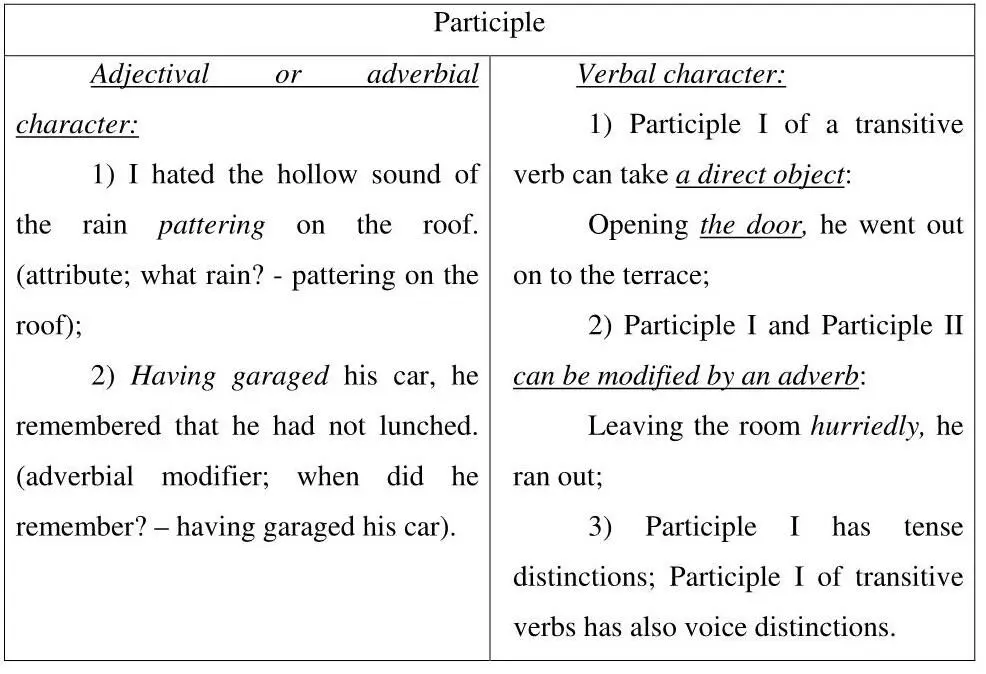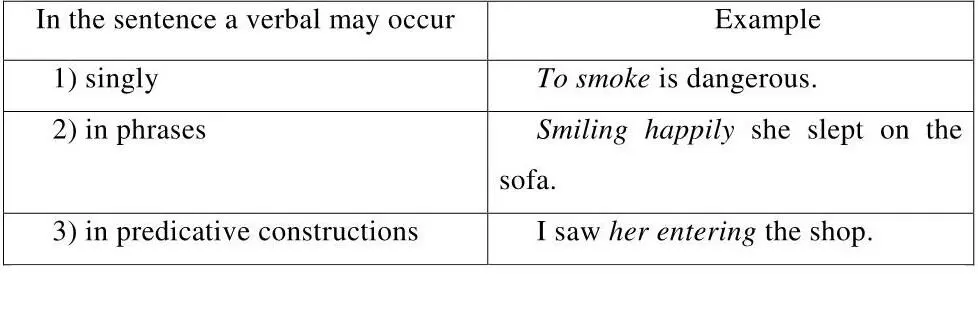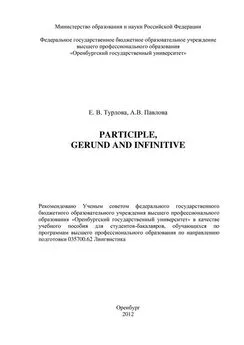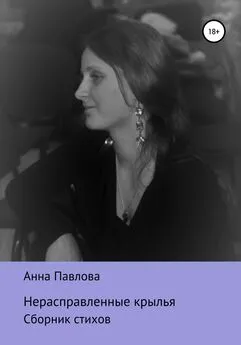Анна Павлова - Participle, Gerund and Infinitive
- Название:Participle, Gerund and Infinitive
- Автор:
- Жанр:
- Издательство:Литагент БИБКОМ
- Год:2012
- Город:Оренбург
- ISBN:нет данных
- Рейтинг:
- Избранное:Добавить в избранное
-
Отзывы:
-
Ваша оценка:
Анна Павлова - Participle, Gerund and Infinitive краткое содержание
Participle, Gerund and Infinitive - читать онлайн бесплатно ознакомительный отрывок
Интервал:
Закладка:
Турлова Е.В.
Participle, Gerund and Infinitive = Причастие, герундий и инфинитив. Учебное пособие
Введение
Учебное пособие “Participle, Gerund and Infinitive” имеет своей целью систематизацию и обобщение теоретического и практического материала по теме «Неличные формы английского глагола: причастие, герундий и инфинитив» для формирования элементов коммуникативной компетенции, развития речевых грамматических навыков. Данное учебное пособие предназначено для занятий по дисциплине «Практическая грамматика первого языка» для студентов-бакалавров 1 курса очной формы обучения по направлению 035700.62 – Лингвистика, профиль «Теория и методика преподавания иностранных языков и культур» во 2 семестре.
Понимание, усвоение, приобретение навыков владения грамматическими категориями глагола, в особенности неличными формами, представляют наибольшие трудности в овладении и совершенствовании использования английского языка.
Учебное пособие состоит из пяти частей. Каждый раздел включает в себя краткое изложение грамматического материала и упражнения. Материал каждой части структурирован по принципу поэтапной работы над грамматическим феноменом. Последовательность упражнений соответствует последовательности изложения грамматики. Кроме того, каждый раздел содержит речевые упражнения ( Speech Exercises) с последующим анализом грамматический явлений. Каждый раздел рекомендовано начинать с упражнений аналитического характера: Analyze the form of… State the function of… и т.п. с предварительным изучением соответствующего теоретического материала по теме. Упражнения тренировочного характера Choose the proper form… Use the appropriate form… Transform the sentences и т.п. могут быть выполнены на занятиях или даны для самостоятельной работы.
После выполнения упражнений основного раздела (подраздела) рекомендуется перейти к упражнениям Speech Exercises. Часть этих упражнений можно дать учащимся для самостоятельной работы с последующей проверкой. Упражнения творческого характера, направленные на развитие навыков употребления изучаемого материала в речи (Make up sentences… What would you say if you took part in the following short dialogues… и т.п.), необходимо выполнять на занятиях под контролем преподавателя.
1 The non-finite forms of the verb (The verbals)
1.1 General Notion
The verb has finite and non-finite forms , which are also called verbals. The verbals do not express person, number or mood. Therefore they cannot be used as the predicate of a sentence.
e. g. He does his home-work. (does – finite form of the verb, it expresses 3 rdperson, singular, present tense, active voice, indicative mood, non-perfect, non-continuous)
e. g. Watching TV he does his home-work. (watching – non-finite form of the verb, it does not express person, number or mood)
Like the finite forms of the verb the verbals have tense and voice distinctions , but their tense distinctions differ greatly from those of the finite verb.
There are three verbals in English: the participle, the gerund and the infinitive.
In Russian we also have three non-finite forms of the verb – причастие, деепричастие, инфинитив.
1.2 The characteristic traits of the verbals
The verbals have the following characteristic traits:
1) they have a double nature, nominal and verbal – the participle combines the characteristics of a verb with those of an adjective; the gerund and the infinitive combine the characteristics of a verb with those of a noun;
2) the tense distinctions of the verbals are not absolute (like those of the finite verb), but relative; the form of a verbal does not show whether the action it denotes refers to the present past or future; it shows only whether the action expressed by the verbal is simultaneous with the action expressed by the finite verb or prior to it:
e. g. I am glad to see you. (the action expressed by the infinitive is simultaneous with the action expressed by the finite verb; the action of being glad and the action of seeing are simultaneous)
e. g. I am glad to have seen you. (the action expressed by the infinitive is prior to the action expressed by the finite verb; the action of being glad is prior to the action of seeing);
3) all the verbals can form predicative constructions, a predicative construction is a construction consisting of two elements:
– a nominal element (noun or pronoun);
– a verbal element (participle, gerund or infinitive).
The verbal element stands in predicate relation to the nominal element, i.e. in a relation similar to that between the subject and the predicate of the sentence. In most cases predicative constructions form syntactic units, serving as one part of the sentence (complex object, complex subject).
• They sat down to supper, Manston still talking cheerfully .
Они сели ужинать; Мэнстон продолжал весело разговариват ь.
Manston still talking cheerfully is a predicative construction with a participle; the participle talking stands in predicate relation to the noun Mansion, which denotes the doer of the action expressed by the participle.
4) in the sentence a verbal may occur:
a) singly, i. e. without accompanying words:
She… went away smiling .
То decide is to act.
b) in phrases, i. e. with one or several accompanying words (an object or an adverbial modifier to the verbal). The phrases form syntactic units serving as one part of the sentence.
A phrase should not be confused with a predicative construction: between the elements of a phrase there is no predicate relation as it does not include a noun or pronoun denoting the doer of the action expressed by a verbal:
• The windows of the drawing-room opened to a balcony overlooking the garden. Окна гостиной выходили на балкон, с которого был виден сад.
• She tried to tranquillize him by reading aloud. Она пыталась успокоить его тем, что читала ему вслух.
c) in predicative constructions:
• My mistress being dead… I had to look out for a new place.Так как моя хозяйка умерла, мне пришлось искать другое место.
• There is no mistake about his being a genius. He может быть никакого сомнения в том, что он – гений.
• She heard him unbar the door and go out into the yard. Она слышала, как он отодвинул засов и вышел во двор.
Table 1 – The use of the verbals in a sentence

2 The Participle
2.1 General notion
The participleis a non-finite form of the verb which has a verbal and an adjectival or an adverbial character.
There are two participles in English – Participle I and Participle II, called the Present Participle and the Past Participle.
Participle I is formed by adding the suffix – ing to the stern of the verb.
As has already been stated, the participle has a verbal and an adjectival or adverbial character.
Its adjectival or adverbial character is manifested in its syntactic functions, those of attribute or adverbial modifier.
Table 2- Double nature of the Participle

In Modern English Participle I has the following forms:
Table 3 – Forms of the Participle Active Voice Passive Voice Expresses an action

2.2 The tense distinctions of the participle
Participle I Indefinite Active and Passive usually denotes an action simultaneous with the action expressed by the finite verb; depending on the tense-form of the finite verb it may refer to the present, past, or future.
When reading The Pickwick Papers, one can't help laughing. When reading The Pickwick Papers, I couldn't help laughing. When reading The Pickwick Papers, you will roar with laughter.
Participle I Perfect Active and Passive denotes an action prior the action expressed by the finite verb.
Mr. Bumble, having spread a handkerchief over his knees… began to eat and drink.
They were, indeed, old friends, having been at school together.
Having already been informed that he always slept with a light in the room, I placed one of the two lighted candles on a little table at the head of the bed…
It should be noted that a prior action is not always expressed by Participle I Perfect: with some verbs of sense perception and motion, such as to see, to hear, to come, to arrive, to seize, to look, to turn and some others, Participle I Indefinite is used even when priority is meant.
Turning down an obscure street and entering an obscurer lane, he went up to a smith's shop.
Свернув на темную улицу и войдя в еще более темный переулок, он подошел к кузнице.
Hearing a footstep below he rose and went to the top of the stairs. Услышав шаги внизу, он встал и вышел на лестницу.
Participle II has no tense distinctions; it has only one form which can express both an action simultaneous with, and prior to, the action expressed by the finite verb.
Читать дальшеИнтервал:
Закладка:










